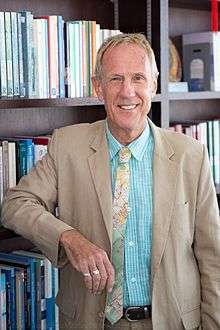Ken Hyland
Ken Hyland is a British linguist. He is currently a professor of applied linguistics in education at the University of East Anglia.[1]
Ken Hyland | |
|---|---|
 | |
| Born | 19 November 1951 |
| Alma mater | University of Warwick |
| Known for | |
| Scientific career | |
| Fields |
|
| Institutions | |
| Thesis | Hedging in scientific research articles |
| Website | Hyland on the website of the University of East Aanglia |
Hyland is an applied linguist in the field of academic discourse, second language writing, and English for Academic Purposes, and has published more than 26 books and 200 articles. Google Scholar shows him to be one of the most cited researchers in Applied Linguistics.[2]
Along with Alister Cumming, Judit Kormos, Rosa Manchón, Paul Kei Matsuda, Lourdes Ortega, Charlene Polio, Neomy Storch, and Marjolijn Verspoor, Hyland is considered one of the most prominent researchers on second language writing.
Career
He is founding co-editor of the Journal of English for Academic Purposes[3] and was co-editor of Applied Linguistics.[4]
Books
Authored
- Hyland, K. (2016) Teaching and Researching Writing. 3rd edition. London: Routledge.
- Hyland, K. (2015) Academic publishing: issues and challenges in the production of knowledge. Oxford: Oxford University Press.
- Hyland, K. (2015). Academic Written English. Shanghai: Shanghai Foreign Language Education Press.
- Hyland, K. (2012). Disciplinary Identities: Individuality and Community in Academic Writing. Cambridge: Cambridge Applied Linguistics.
- Hyland, K. (2009). Teaching and Researching Writing. 2nd edition. London: Longman.
- Hyland, K. (2009). Academic Discourse: English in a Global Context. London: Continuum.
- Hyland, K. (2006). English for Academic Purposes: An Advanced Resource Book. London: Routledge.
- Hyland, K. (2005). Metadiscourse: Exploring Interaction in Writing. London: Continuum.
- Hyland, K. (2004). Genre and Second Language Writing. Ann Arbor: University of Michigan Press.
- Hyland, K. (2004). Disciplinary Discourses: Social Interactions in Academic Writing. Ann Arbor: University of Michigan Press.
- Hyland, K. (2003). Second Language Writing. New York: Cambridge University Press. [Awarded Honorable Mention for the Kenneth W. Mildenberger Prize, Modern Languages Association].
- Hyland, K. (2002). Teaching and Researching Writing. London: Longman.
- Hyland, K. (2000). Disciplinary Discourses: Social Interactions in Academic Writing. London: Longman
- Hyland, K. (1998). Hedging in Scientific Research Articles. Amsterdam: John Benjamins.[5]
Edited
- Hyland, K. (ed.) (2017). The Essential Hyland. London: Bloomsbury Press.
- Wong, L. & Hyland, K. (eds.) (2017). Faces of English Education: Students, Teachers and Pedagogy. London: Routledge.
- Hyland, K. (ed.) (2017). Academic Writing: critical readings vol 1–2. London: Bloomsbury Press.
- Hyland, K & Shaw, P. (eds.) (2016). The Routledge Handbook of English for Academic Purposes. London: Routledge.
- Hyland, K. & Wong, L. (Eds.) Innovation and Change in Language Education. London: Routledge.
- Hyland, K. (Ed.) (2013). Discourse Studies Reader. London: Bloomsbury Publishing.
- Hyland, K. & Sancho Guinda, C. (Eds.) (2013). Stance and Voice in Written Academic Genres. London: Palgrave Macmillan.
- Hyland, K., Chau M. H. & Handford, M. (Eds.) (2012). Corpus Applications in Applied Linguistics. London: Continuum.
- Hyland, K & Paltridge, B. (Eds.) (2011). Continuum Companion to Discourse Analysis. London: Continuum.
- Hyland, K. & Diani, G. (Eds.) (2009). Academic Evaluation: Review Genres in University Setting. London: Palgrave-MacMillan.
- Hyland, K. & Bondi, M. (Eds.) (2006). Academic Discourse Across Disciplines. Frankfort: Peter Lang.
- Hyland, K. & Hyland, F. (Eds.) (2006). Feedback in Second Language Writing: Contexts and Issues. New York: Cambridge University Press.
- Candlin, C. & Hyland, K. (Eds.) (1999). Writing: Texts, Processes and Practice. London: Longman.
- Berry, R., Asker, B., Hyland, K. & Lam, M. (Eds.) (1999). Language Analysis, Description and Pedagogy. Hong Kong: Hong Kong University of Science and Technology Press.[5]
References
- "Professor Ken Hyland page at CAES, HKU".
- "Professor Ken Hyland page at Google Scholar".
- "Journal of English for Academic Purposes".
- "Applied Linguistics".
- "Professor Ken Hyland's Personal Website". Archived from the original on 2018-06-24. Retrieved 2017-04-13.